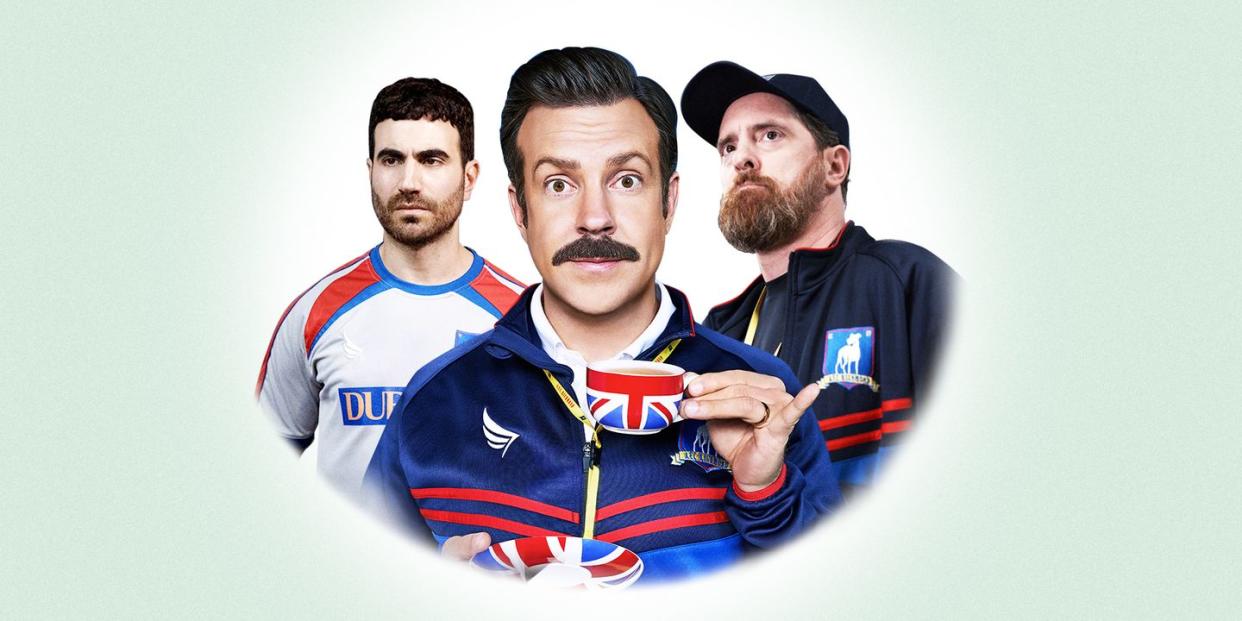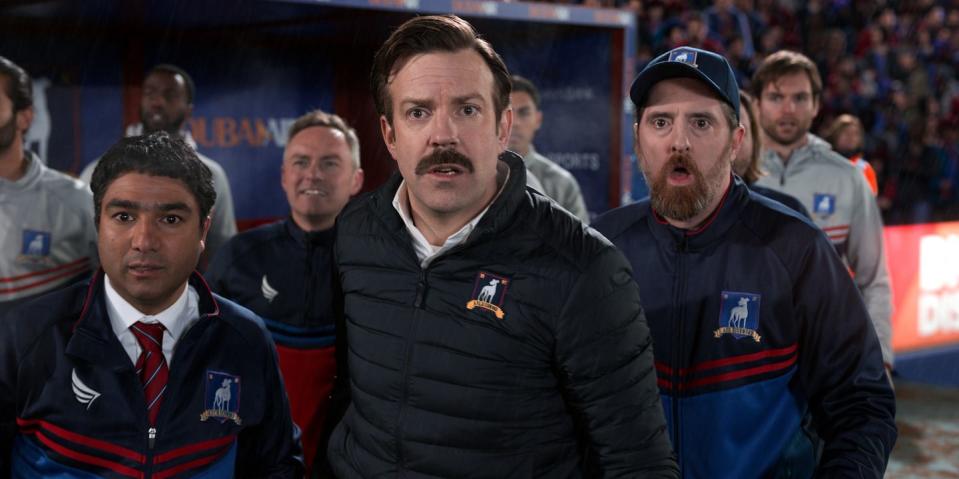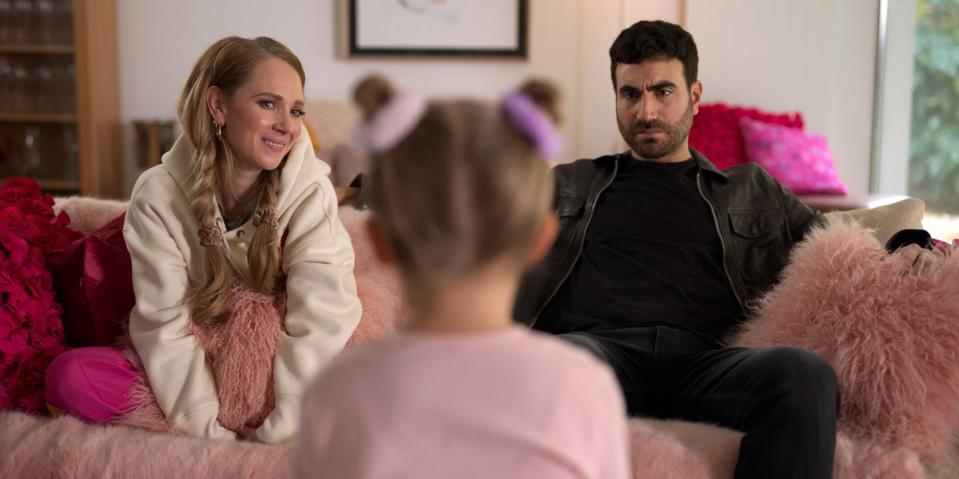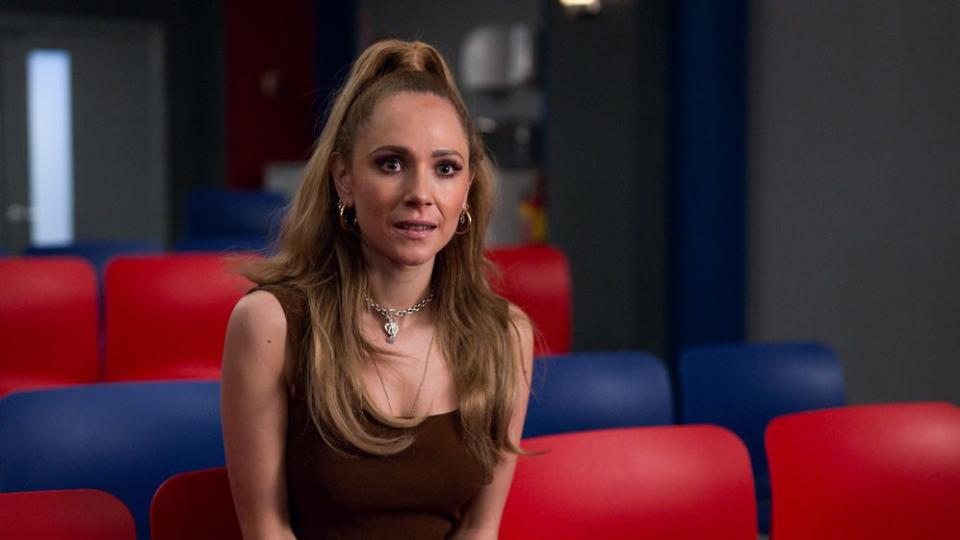'They're Walking a Fucking Tightrope and It's Perfect': How 'Ted Lasso' Made Nice Comedy Funny

- Oops!Something went wrong.Please try again later.
That there is a Jason Sudeikis comedy series about an American coach of an English football team, based on a series of NBC Sports promos, is slightly unusual.
But that this show is becoming a word of mouth sensation while other bigger and buzzier shows have come and gone, that it is making American audiences laugh, cry and cheer despite negligible national interest in Premiere League football, that it is up for Best Comedy Series and Sudeikis is up for Best Actor in a Comedy in this Sunday’s Golden Globes, and that it’s done it all while being the nicest show on television, feels straight up miraculous.
That, my friends, is where we are. Ted Lasso, like its title character, is charming, guileless, generous, and saving the day with goodness. In a time where everything feels malicious and bad, the Very Nice Apple TV+ show has found a passionate fanbase and critical acclaim. Against all odds, it's the winning underdog show about an underdog whose job is to lose. I spoke to Ted Lasso's cast and creators, along with some of its dedicated fans about what makes this kindhearted gem of a series actually work.
“Here's what I think is good about Ted Lasso,” says writer Brett Goldstein, who plays aging, angry midfielder Roy Kent, "and what I’m proud of in it, as a writer: It’s about kindness and teamwork and empathy, and being curious and not judgmental, but it does all of that through storytelling and plot. I've seen stuff that says be nice and I think: you're not showing me anything. You're telling me, like a Hallmark card: be nice, nice to be nice, innit?”
Given the plot, leaning into the comedy of cruelty we’ve seen in recent years would have been the safe play: Ted Lasso is recruited to coach the fictional and struggling Premiere League team AFC Richmond. He’s already a fish out of water, even before we learn that he’s secretly been hired by team owner Rebecca (Hannah Wadlington, last seen yelling “SHAME” at Cersei on Game of Thrones) to tank their standing and get them relegated, as revenge on the philandering ex-husband from whom she won the team in a divorce settlement. The stage is set for deception and abuse. Meanness.
They never show up. “We started with the character of Ted,” says co-creator Brendan Hunt, who plays Lasso’s stoic right-hand man Coach Beard. “Ted’s this Midwestern guy, based on coaches Jason had, and theater professors I’d had, just good people who wanted to give everyone a chance.” Ted approaches his new milieu with curiosity, care, and cookies; we learn in episode one that the biscuits he brings his new boss each morning are made by hand, by him.
The magnanimity radiates outward from the center; Ted’s unswerving drive to do the right thing slowly compels the rest of the characters to act from love. Goldstein’s Roy, model/football girlfriend Keeley (Juno Temple), the team, even Rebecca herself begin to reach for their best selves.
It works, and it takes the viewer by surprise after a decade of the comedy of coldness. “I think we've been trained to be really cynical,” says Jon Herman, screenwriter of Straight Outta Compton and fellow surprise Lasso fan. “What was funny was people being shitty to each other, humiliating each other.” Crueler became equated with funnier, meaner with more authentic; think The League and The Hangover. “It felt like people didn’t want to have any hope.”
Hunt himself was running out of hope just before the show got moving. Friends since performing together at Chicago ComedySportz in the ‘90s, he and Sudeikis worked together on the original Ted Lasso NBC Sports promos in 2013. “After they started airing, [co-creator] Joe Kelly and I went to Jason’s house in Brooklyn and beat out a six-episode season, on the UK Office model of twelve episodes and a special. And we loved what we had, but then Jason kept…” he pauses, searching for the right word, “…having children. So it would be like: We’re gonna do it, wait, no we’re not. I was hanging by a thread at this point in life anyway.” Hunt was living on sitcom guest star appearances and writing plays for 99-seat Los Angeles theaters. “I was rather looking forward to doing the show, and then finally, I decided it wasn't happening, and there is no love, and Santa Claus is dead.”

Always bet on red and white. “A couple years later, I’m talking to Jason and he says ‘Is our Ted Lasso stuff still online?,’ which suggests that he doesn't know how Google Drive works, and I said it was, and he said ‘Because I’m about to have lunch with [Scrubs creator] Bill Lawrence.’ And then two months later we’re all having dinner, and two months after that we’re all in a writers’ room.”
Goldstein had worked with Lawrence on NBC’s Undateable, and joined the staff after a late-night FaceTime with Sudeikis. “I always remember this because it was really nice,” he says. “We’d been on the phone for an hour and then we got cut off, and he immediately called back and then we spoke for another half hour. And then I went up to bed and my girlfriend said, ‘Oh, you two are in love with each other.’”
In the writers’ room, Lawrence had one major rule: “The one thing that he said loudly and repeatedly was ‘It's not a soccer show.’ He was super insistent that it be workplace comedy first, and if soccer nerds like me want to put soccer stuff in there, then fine.” Hunt, Sudeikis and Kelly had their own rules: “We didn't want anyone to just do stuff. We wanted to know why people did stuff. Rebecca has bad intentions for Ted and for the team, but why? Everything had to be justified, not just narratively or intellectually, but because each action tells us something about them and why they are the way they are.” It sounds basic, but Ryan Murphy could take a note here.
“Our own Midwestern-ness must come into it too,” says Hunt. “We think whatever they’re showing to the world, everyone is good inside. So we wrote something where even if people are dicks to Ted, even if they don’t initially want him there, they’re not actually bad people. They’re just stuck in bad moments.”
Like many of us, Hunt has a fraught relationship with sports. “As a child of a broken home, we were not allowed opportunities for personal enrichment sports-wise,” he laughs, “but I wanted to be good at sports. I liked them. There was a long period where I'd see my dad once a year, and he would take me to a White Sox game because I was growing up on the North Side and he wanted to make sure that I didn't become a Cubs fan, because he was from the South Side.” So the love struck him early, but the knack never followed. “Little League was absolutely one of the most unpleasant experiences of my life, I was just cartoonishly, embarrassingly bad.” One kind coach helped: “I had this one really gentle, gray goatee, glasses on his nose kind of coach. I'd been not good at the game and I wasn’t making friends. He took me aside and put his hand on my shoulder and said, ‘You’re swinging too hard, Brendan, just make contact.’ It had been a long time since a fatherlike figure had acted in a fatherly way to me.” He took the coach’s advice. “To this day I've never hit a ball further in my life, just a rocket down the right field line.” He smiles. “It was a foul ball, and it was the most exciting thing to happen to me that year.”

For a Brit like Goldstein, football is religion. “My dad is fucking serious about football. Like if I ever dated an Arsenal fan, he called that marrying out.” But football is also therapy. “With me and him, and I think this is fairly common, football is how we communicate. I could call him any day of the week and go, ‘So what's happening at Tottenham? What's going on with these changes?’ What I'm really saying is ‘I love you and I miss you,’ but I can't, so I have to say that.”
When it came time for the part of Roy to be cast, Goldstein took a kick at it. “Probably around episode five,” he says, “I started to think, I could do this. So my very last day in the writers’ room, I said, ‘Oh, I had a lovely time, thank you.’ But the night before, I’d made a self-tape of five scenes as Roy, and when I left, I emailed them: I appreciate that no one is thinking of me for Roy, and if this is embarrassing or awkward, pretend you never got this email and I will never bring it up and we can carry on as normal. And then luckily they liked it.”
It worked because he understood the sadness underneath Roy’s anger. “I grew up with a lot of footballers. I have genuine empathy for the fact that if you're a professional footballer, you've often started at three years old, you've been found, you’ve been scouted, you play, you play, you play, you make millions, you live this incredible life. And then you reach 35, and suddenly you have to stop doing it, and you haven't been taught anything else. You don't know what the world is like. I think that's quite heartbreaking. You burn very brightly and then it's gone and you’ve still got quite a lot of life left to live."
While Hunt and Goldstein both have the love of the game, they each lack the talent. “Brett’s lucky I exist, because I saved him from the indignity of being the worst at football, but nobody used their football double more than him. It’s a triumph of movie magic,” Hunt says. Goldstein agrees: “There’s some very good editing going on there.”

For the role of Keeley, based on a model and UK tabloid celebrity friend of Sudeikis, they reached out to Juno Temple, who wasn’t known for comedy and remains unconvinced that she has the talent. “As late as episode seven, she was certain she didn’t know how to do comedy,” Hunt says. “And we were all like, are you kidding me?” Goldstein agrees: “Either she's a genius and she's playing us all for fools, or she doesn't know that she's just naturally got it. And I don't know which. She's convincing when she says, ‘I don't know. I'm not funny,’ and meanwhile you're like, ‘It seems like you're stealing every scene you're in.’”
And then there’s Coach Beard, man of impressively few words. “I'm loquacious in real life, I'm gabby,” Hunt says, “But when we were filming the spots, Joe said ‘I think if your character can have one word lines, that's what it should be. He should talk as little as possible.’ It hits because Ted is waxing philosophical all the time, and I'm saying only the information that he needs to be able to go on. We’re still trying to honor that now. I think it's a really fun way to play it.” Jon Herman puts it succinctly: “Ted is a Zen guy, and Beard is his Zen guy.”
Be Ted Lasso
— Sarah Silverman (@SarahKSilverman) February 5, 2021
So why is it resonating so deeply, and why now? Herman has a theory. “If you lived through the last four years, you were in a place like, why hope for the best, everything just sucks. But there's a different tenor now. Weird things are happening that never would have before, like the whole thing with Georgia. We’d been trained to think, Oh no, we'll never win those seats. And then we did and you're like, Oh shit. You can actually hope for something good to happen.” Like a lot of people, Herman only came to the show in the last few months; last year, he’d been watching The Outsider and Ozark, “But now those shows seem super grim and dark. Why not a show that makes you feel better about stuff?”
Hunt agrees. “I hope people would have liked the show whenever it had come out. But coming at the ass end of the Trump era, I think the show was a real relief. It was refreshing for people to see a not-ugly American. To see someone not be shitty, to see someone try to be what we tell ourselves we are.”
People are noticing. Ron Howard tweeted “It’s so fresh, yet it reminds me of a hipper, funnier Mr. Deeds.” Vulnerability ambassador Brene Brown raved about it online and in her podcasts. And after Sarah Silverman’s simple tweet “Be Ted Lasso” went viral, she told me: “Jason did it. He figured out how to do hard comedy with massive heart without a drop of cheese. It feels absolutely effortless, but make no mistake: they’re walking a fucking tightrope here, and it’s perfect.”
Son Reed tipped us off to @TedLasso a few weeks ago and Cheryl & I are hooked. So fresh yet it also kind of reminds me of a hipper funnier Mr. Deeds. Bravo. Check it out https://t.co/Mbl7xCkIEL
— Ron Howard (@RealRonHoward) September 19, 2020
Goldstein is as surprised about the show’s slow-growing success as we are. “It's definitely not as big in the UK,” where the team is currently filming season two, “and I'm just aware of it from Twitter, frankly. Every day there seems to be someone amazing suddenly going, ‘I love Ted Lasso, why did nobody tell me about this?,’ and you go, ‘Alright. Okay, cool, cool."
Skip this paragraph if you have not watched Ted Lasso, because there will be spoilers. Even though the show is designed to warm your heart, season one does not have a happy ending. They lose the big game, they get relegated, and it’s because of Ted. “The one football thing that Ted has learned and encouraged is to make the extra pass,” Goldstein says, and the extra pass is made by Richmond’s surly former star player Jamie, traded mid-season to Manchester United. “Jamie's finally done what Ted's taught him, and it gets Richmond relegated. Rebecca, for all her journey, completes her original mission. It's not a fairy tale, and I think that's what’s cool about it.”
But hope springs eternal. Season two is underway, Hunt became a first-time father last month at age 49, and there just might be a hazy pandemic finish line taking shape on the horizon. Hunt says, “For a while I’ve had the thought that everyone's had: oh boy, when I see people I'm just going to hug them so much. But the other day I realized, oh no, each individual person I'm going to cry with, every single friend there'll be a hug and it'll go too long, and then we'll just collapse in each other's arms. And we'll have to go through this 10 minute cycle with every single person.”
I can’t wait. But until you can have an actual hug, Ted Lasso is the next best thing.

Get 87 Years of Award-Winning Journalism, Every Day
Join Esquire Select
You Might Also Like

